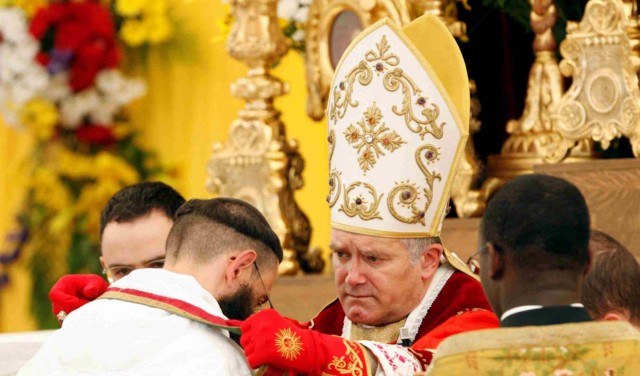CDF Assumes SSPX File

As expected, Pope Benedict XVI has brought the Pontifical Commission Ecclesia Dei under the auspices of the Congregation for the Doctrine of the Faith.
American Cardinal William Levada, the CDF’s prefect, will replace Cardinal Dario Castrillon Hoyos as president of the commission, which is charged with trying to reconcile the Society of St. Pius X with the Church.
The Pope has named Msgr. Guido Pozzo as secretary of Ecclesia Dei.
The changes came in the form of a motu proprio, entitled Ecclesiae unitatem, which was signed by the Pope July 2 and which explained the details of the restructure. In a Vatican statement, the Holy Father “thanked the Emin. Cardinal Darío Castrillón Hoyos, at the end of his service as president of the Pontifical Commission ‘Ecclesia Dei’ and has named as president of said Commission the Emin. Card. William Joseph Levada, prefect of the Congregation for the Doctrine of the Faith.”
The Vatican statement also contained the following explanation concerning the reasons behind the motu proprio:
“As anticipated in the letter of the Holy Father to the bishops of the Catholic Church regarding the remission of the excommunication of the four bishops consecrated by Archbishop Lefebvre (10 March 2009), published today is the motu proprio letter ‘unitatem Ecclesiae,’ by which he has redesigned and updated the structure of the Pontifical Commission Ecclesia Dei, which was established by Pope John Paul II in 1988.”
Ecclesiae unitatem explains why authority over discussions with the SSPX has been shifted to Cardinal Levada’s doctrinal congregation. In the motu proprio, Benedict notes that remission of the excommunication of the four SSPX bishops in January was an action he undertook in the context of canonical discipline to free the leaders of the traditionalist society from the weight of the most serious ecclesiastical censure, in hopes of fostering reconciliation while recognizing that questions of doctrine continue to divide the society from the Church.
Until these doctrinal issues are clarified, the SSPX cannot enjoy canonical status in the Church and its ministers are not engaged in any legitimate way with the Church’s ministry, the motu proprio states. And since the problems are essentially doctrinal in nature, Ecclesia Dei has been incorporated into the Congregation for the Doctrine of the Faith and Cardinal Levada has been delegated “to submit the principal cases and questions of a doctrinal nature for study and discernment according to the ordinary requirements of the Congregation for the Doctrine of the Faith and to submit the results thereof to the superior dispositions of the Supreme Pontiff,” Ecclesiae unitatem states.
At the conclusion of his motu proprio, Benedict states, “With this decision I wish in particular to show paternal solicitude towards the Society of Saint Pius X, with the aim of rediscovering the full communion of the Church.”













